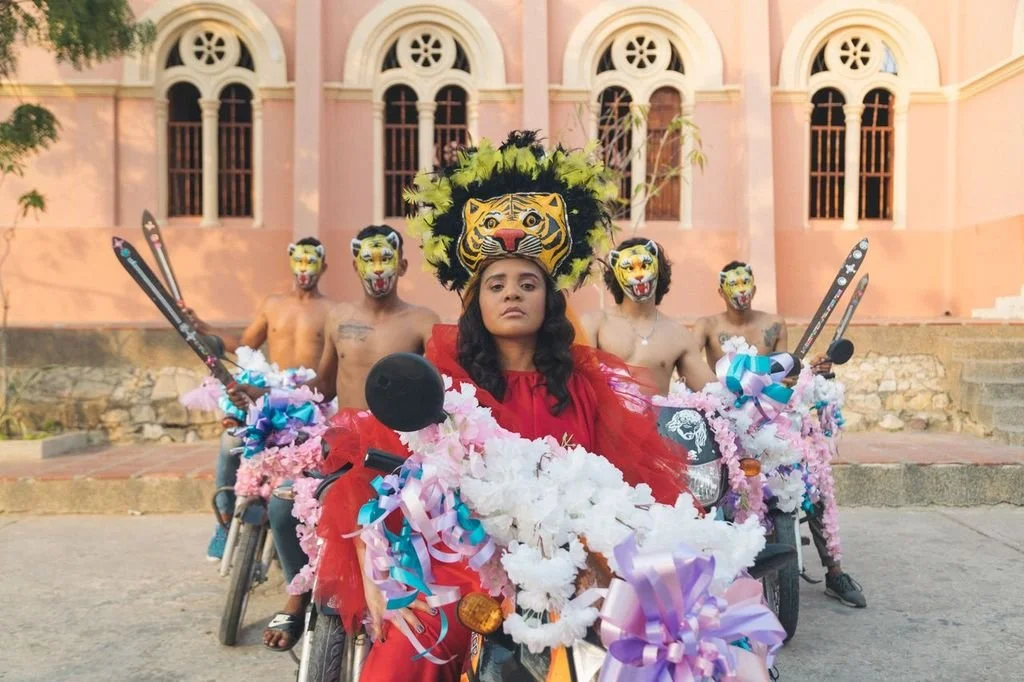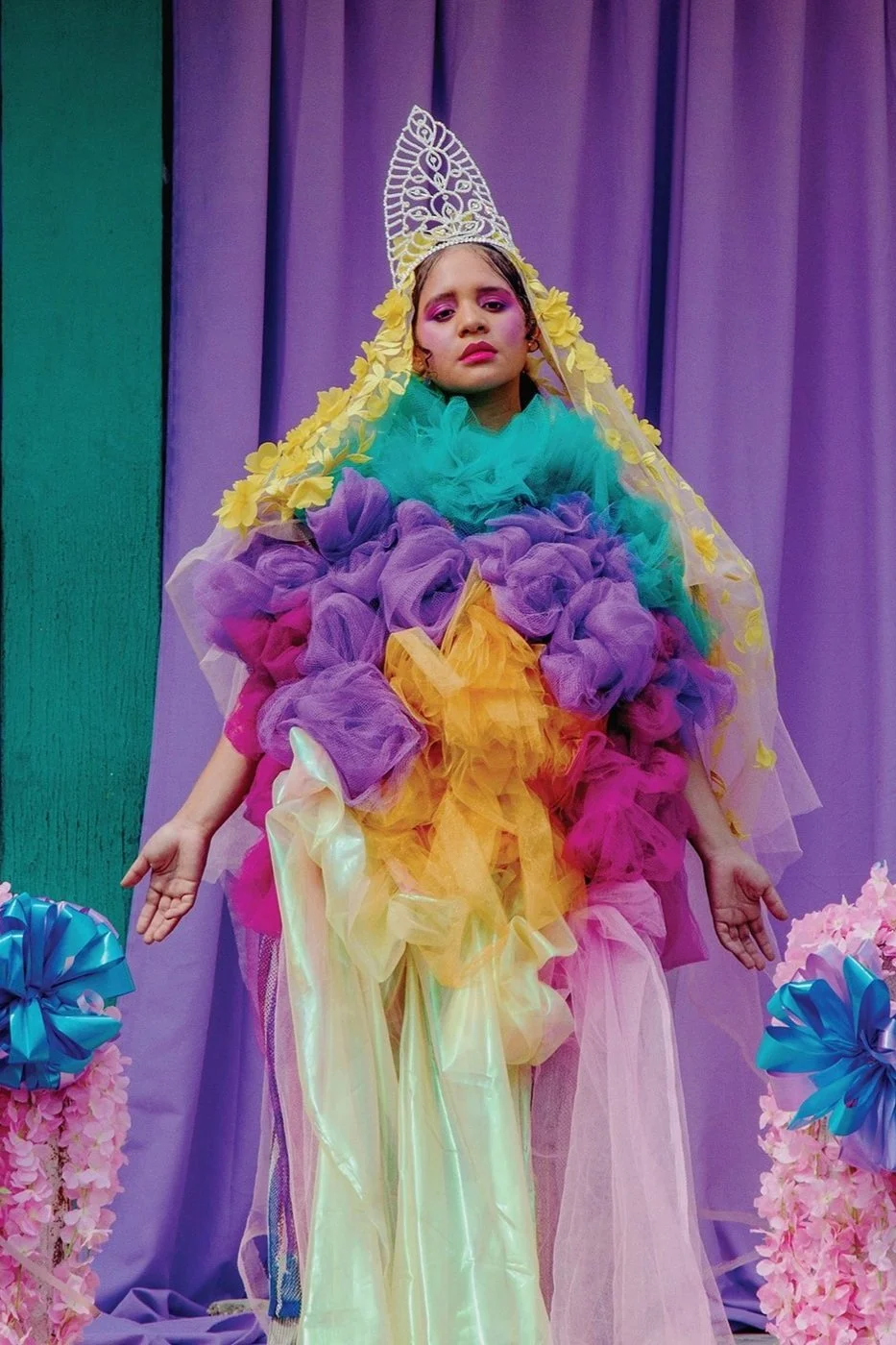Singer Lido Pimienta aims to escape world-music aisle, breaking down cultural and artistic barriers
Appearing with Vancouver Latin American Cultural Centre, Miss Colombia artist asserts the freedom to blend art pop with cumbia, electronica, and other forms
Lido Pimienta, from Miss Colombia. Photo by Daniella Murillo
Vancouver Latin American Cultural Centre presents An Evening with Lido Pimienta at the Queen Elizabeth Theatre on October 13
DEFYING THE BOUNDARIES of genre and stereotype, Toronto-based musician Lido Pimienta weaves experimental pop melodies influenced by her Afro-Colombian heritage.
Pimienta invites audiences to enter a lush soundscape inspired by her home in the northern Caribbean Coast of Colombia when she performs in a Vancouver Latin American Cultural Centre presentation marking Latin American Heritage Month.
“I’m on a journey of continuing my ethos to showcase the Caribbean as sublime, as opposed to this notion that it is this exotic place where people can come have a good time and leave their trash behind,” Pimienta says in a phone interview with Stir. “It’s very much about the sublime quality of a people who are resilient and deep in culture, colour, and joy despite oppression.”
Sung entirely in Spanish, Pimienta’s most recent album Miss Colombia debuted in 2020 and received critical acclaim for its genre-bending compositions, stunning visuals, and explorations of feminism, colonialism, and cultural identity. Spanning a rich variety of influences, such as art pop, electronica, and cumbia, Pimienta has captured the hearts of her fans with her ethereal vocals and refusal to adhere to limiting standards.
“Miss Colombia was an experimental pop album, but because I’m the one who sings and writes these songs, I immediately get thrown into the world-music aisle,” Pimienta says. “If you want to be successful within the music industry, Reggaeton is the only thing that you can perform if you happen to be from Latin America. Why can’t I explore every genre that I want without having to be delegated? I don't follow trends that sell records or that fill stadiums, but that’s not the reason why I make art.”
Pimienta has never been the type to dilute her artistic persona or politic, performing in punk bands in Colombia as early as age 11. Despite her willingness to ruffle a few feathers when needed, the singer has faced adversity navigating her identity within a Canadian context, often feeling held back by reductive perceptions of her character.
“In Colombia, it is a given that you have a mixed heritage and a complicated past. It is a given that everyone has a struggle, and we don’t really engage in competition over who suffers the most to decide who has more right to land or to take space,” Pimienta says. “In Canada, we tend to academize everything. When culture is not allowed to just be culture and you have to validate it with academia, it overcomplicates things.”
“I wish that I could just introduce myself as, ‘I am an artist who is a mother and a mother who happens to be an artist,’” she continues. “But whenever I get introduced on a stage in Canada, it’s like, ‘Indigenous, Afro-Colombian, of Wayuu ancestry’, and this long list of all the signifiers that I wish I didn’t have so that I can assert myself. It’s a lot of pressure, because instantly it turns you into this person that has to represent an entire race.”
Pimienta attributes the problem to the place this country is in right now as it grapples with a painful past.
“In Canada, we are in this process of learning about the tragedy of colonialism,” she says. “So a lot of people are moving in cultural spaces with guilt, and maybe not even guilt, but just this sense of ‘I don’t want to be called out’. It makes things very dry and calculated. There has to be space for people to express themselves honestly, and to make mistakes, because it’s not pretty. None of these subjects are pretty—it’s not meant to be pretty, we are changing the paradigm. It’s almost like growing pains.”
Aiming to shift perceptions and invite audiences to experience the full spectrum of her expression, Pimienta has been finding new ways to break down cultural and artistic barriers.
“I started thinking, ‘Why don't I start writing classical music?’” Pimienta says. “When you think about the words ‘classical music’ out loud, it’s European music. We don’t think about Afro rhythms, we don’t think about cumbia, or we don’t think about tambora as classical, which to me, that's classical music. They don’t fit into that worldwide canon.”
Around the time she started composing her distinct classical music, Pimienta says she received a call from American choreographer Andrea Miller, asking her to write a piece for the New York City Ballet. “That led to creating this gorgeous composition that, for the second time ever in over 70 years, had been written by a woman in the institution of the Lincoln Center, where the New York City Ballet resides,” she says. “So that was very transformative for me, and very major for me to take part in that.”
Utilizing Latin folk rhythms, Pimienta’s composition sky to hold debuted in 2021, making her and Miller the first all-female team to be commissioned by the ballet.
Pimienta continues to draw from her cultural traditions in her performances, accompanied by her partner Brandon Valdivia, who will be integrating Afro-Caribbean drumming into her Vancouver set.
“Brandon is such a talented musician, such a prolific, talented maestro,” Pimienta says of her partner and bandmate. “When we get together, it almost becomes this ceremony of experimentation and improvisation. It feels like you’re watching a jazz show or a very raw avant-garde art show when you see us perform.”
Pimienta says her Vancouver performance is a special one, because it will mark the end of her Miss Colombia era. “I will be doing Miss Colombia songs and songs from my first album, but I will also be doing unreleased songs from my upcoming album. I think it’s so important to play before the album is out, so that the audience can become a part of the journey.” ![]()














